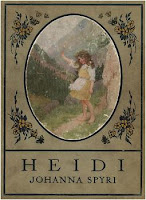They're feisty, elusive little things, aren't they? Anne Shirley once said, "It wouldn't do to have all our dreams fulfilled. We would be as good as dead if we had nothing left to dream about." And yet, it can also be detrimental to our poor little souls to have our dreams constantly denied. The book of Proverbs says, "Hope deferred makes the heart sick, but when dreams come true, there is life and joy."
I don't know how you feel about the subject, but I tend to keep my dreams pretty close to the chest. For one thing, I know how vulnerable they are: some of the more fragile ones can be slayed by a single skeptical glance. For another thing, I tend to feel (erroneously, perhaps) that revealing them makes me seem weak, or even more seriously, that admitting I want them shows what a selfish prat I really am.
But I begin to wonder if I shouldn't hold them so close. I wonder if perhaps I ought to let them try their little wings from time to time. Because when it comes to other people, I find that I consider dreams to be among the most precious, sacred things the heart contains. Nothing connects me to another person faster than learning about their most cherished desire, even if that desire seems outwardly ridiculous. Almost always, I find myself saying, "Oh, you should!" Why? Because I believe it is important to dream. I believe it is imperative that we frail, ephemeral humans run headlong after the things tugging at our souls. How could we live full lives if we didn't?
So. Here are some of my dreams:
A wee cottage in the country...
with one of these,
and one of these,
and some of these,
where I could spend every morning doing this
and every afternoon doing this.
But of course, the dream that haunts me most looks like this:
Others I have cannot be captured so easily in images, but they linger just the same, whispering in my ear when I catch a glimpse of a sunrise, settling over my shoulders when I sit around a table with my family, brushing past my ear with the sudden strain of a violin.
Why do I bring all this up? Because I have begun to be convicted in the belief that it is of the utmost importance to encourage one another in our dreams. It's awful to see your dreams "deferred" (see this poem by Langston Hughes), but it is infinitely worse to have them scorned, discouraged, or even simply doubted. (Anyone who has ever had to explain their writing "habit" to a dubious acquaintance or extended family member understands the torment of that experience.) Conversely, the experience of being wholly and unflaggingly believed in is almost as wonderful as achieving the dream itself. When someone you love is willing to stand at your side in the face of grueling hard work and opposition, and say, "I know you can do this," you find, miraculously, that you can.
So I say to you now, do not be a doubter of dreams. Do not look into the soul of another human creature and say, "You can't." Because while it may only cause that dreamer to toughen her skin and overcome another battle against doubt, it might also break her. And this world is broken enough to be getting on with.
What say you? If you feel so inspired, share your own dreams on your blog and post a link here. I would love to come by and say, "You can."















































